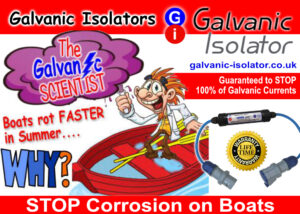Sun's Our.... Watch Out For Corrosion!!
Why Does Galvanic Corrosion Happen Faster in the Summer months?
 That's a really great question! Galvanic corrosion occurs when metals are submerged in an electrolyte, like the liquid found in a car battery. In this scenario, a chemical reaction generates voltage at the battery terminals. When you complete the circuit—say, by connecting a light bulb—an electric current flows.
That's a really great question! Galvanic corrosion occurs when metals are submerged in an electrolyte, like the liquid found in a car battery. In this scenario, a chemical reaction generates voltage at the battery terminals. When you complete the circuit—say, by connecting a light bulb—an electric current flows.
In the case of galvanic corrosion, instead of lighting a bulb, the galvanic current can erode the metal parts of your boat, particularly around the waterline, propellers, and any underwater metalwork.
Thinking again about car batteries.... They tend to perform better in warm weather and struggle in the cold. Why? Because the chemical reactions inside the battery become more active when it’s warm. This principle applies to many chemical reactions.
 Consider a scientist heating a test tube over a Bunsen burner. They do this to speed up the reaction. Similarly, if you’re brewing wine or beer, keeping the liquid warm is essential for fermentation.
Consider a scientist heating a test tube over a Bunsen burner. They do this to speed up the reaction. Similarly, if you’re brewing wine or beer, keeping the liquid warm is essential for fermentation.
The same logic applies to galvanic corrosion. Since it’s a chemical reaction, it accelerates at higher temperatures. That’s why, during the summer months, it’s crucial to use galvanic isolation if you’re connected to an electric hookup. In short, warmer water speeds up the reaction that leads to metal loss.
If you'd like to explore our range of galvanic isolators to protect YOUR boat, visit our website, please click <HERE> to find out more.


